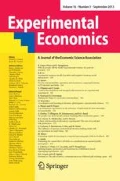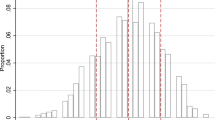Abstract
The formation of human capital is important for a society’s welfare and economic success. Recent literature shows that child health can provide an important explanation for disparities in children’s human capital development across different socio-economic groups. While this literature focuses on cognitive skills as determinants of human capital, it neglects non-cognitive skills. We analyze data from economic experiments with preschoolers and their mothers to investigate whether child health can explain developmental gaps in children’s non-cognitive skills. Our measure for children’s non-cognitive skills is their willingness to compete with others. Our findings suggest that health problems are negatively related to children’s willingness to compete and that the effect of health on competitiveness differs with socio-economic background. Health has a strongly negative effect in our sub-sample with low socio-economic background, whereas there is no effect in our sub-sample with high socio-economic background.
Similar content being viewed by others
References
Aughinbaugh, A., & Gittleman, M. (2003). Does money matter? A comparison of the effect of income on child development in the United States and Great Britain. The Journal of Human Resources, 38(2), 416–40.
Benjamin, D. J., Brown, S. A., & Shapiro, J. M. (2007). Who is ‘behavioral’? Cognitive Ability and Anomalous Preferences. SSRN-Working Paper No. 675264.
Bettinger, E., & Slonim, R. (2007). Patience among children. Journal of Public Economics, 91, 343–363.
Black, S. E., Devereux, P. J., & Salvanes, K. G. (2005). The more the merrier? The effect of family size and birth order on children’s education. The Quarterly Journal of Economics, 120(2), 669–700.
Blau, D. (1999). The effect of income on child development. Review of Economics and Statistics, 81, 261–76.
Case, A., Lubotsky, D., & Paxson, C. (2002). Economic status and health in childhood: the origins of the gradient. The American Economic Review, 92, 1308–34.
Case, A., Fertig, A., & Paxson, C. (2005). The lasting impact of childhood health and circumstance. Journal of Health Economics, 24, 365–89.
Cunha, F., & Heckman, J. (2007). The technology of skill formation. The American Economic Review, 97(2), 31–47.
Cunha, F., & Heckman, J. (2009). The economics and psychology of inequality and human development. Journal of the European Economic Association, 7(2-3), 320–364.
Currie, A., Shields, M., & Price, S. (2007). Is the child health/family income gradient universal? Evidence from England. Journal of Health Economics, 26, 212–32.
Currie, J. (2009). Healthy, wealthy and wise: socio-economic status, poor health in childhood, and human capital development. Journal of Economic Literature, 47(1), 87–122.
Currie, J., & Stabile, M. (2003). Socio-economic status and child health: why is the relationship stronger for older children? The American Economic Review, 93, 1813–23.
Currie, J., Stabile, M., Manivong, P., & Roos, L. (2010). Child health and young adult outcomes. The Journal of Human Resources, 45(3), 517–548.
Dohmen, T., Falk, A., Huffman, D., & Sunde, U. (2009). Homo reciprocans: survey evidence on behavioral outcomes. Economic Journal, 119, 592–612.
Dohmen, T., Falk, A., Huffman, D., & Sunde, U. (2010). Are risk aversion and impatience related to cognitive ability? The American Economic Review, 100(3), 1238–1260.
Dustmann, C., Rajah, N., & van Soest, A. (2003). Class size, education and wages. Economic Journal, 113, 99–120.
Frederick, S. (2005). Cognitive reflection and decision making. The Journal of Economic Perspectives, 19(4), 24–42.
German Federal Statistical Office (2004). Krankenversicherung in Deutschland. Sonderauswertung des Mikrozensus 2003. Wiesbaden.
Goodman, R. (2001). Psychometric properties of the strengths and difficulties questionnaire (SDQ). Journal of the American Academy of Child and Adolescent Psychiatry, 40, 1337–45.
Heckman, J. J. (2007). The economics, technology, and neuroscience of human capability formation. Proceedings of the National Academy of Sciences of the United States of America, 104, 13250–55.
Heckman, J., Stixrud, J., & Urzua, S. (2006). The effects of cognitive and non-cognitive abilities on labor market outcomes and social behavior. Journal of Labor Economics, 24(3), 411–82.
Hoffrage, U., Weber, A., Hertwig, R., & Chase, V. M. (2003). How to keep children safe in traffic: find the daredevils early. Journal of Experimental Psychology. Applied, 9, 249–60.
Knight, Jonathan (2002). Sexual stereotypes. Nature, 415, 254–56.
Knudsen, Eric I., Heckman, James J., Cameron, Judy L., & Shonkoff, Jack P. (2006). Economic, neurobiological, and behavioral perspectives on building America’s future workforce. Proceedings of the National Academy of Sciences of the United States of America, 103(27), 10155–62.
Kromeyer-Hauschild, K., Wabitsch, M., Kunze, D., Geller, F., Geiß, H. C., Hesse, V., von Hippel, A., Jaeger, U., Johnsen, D., Korte, W., Menner, K., Müller, G., Müller, J. M., Niemann-Pilatus, A., Remer, T., Schaefer, F., Wittchen, H.-U., Zabransky, S., Zellner, K., Ziegler, A., & Hebebrand, J. (2001). Perzentile für den Body-Mass-Index für das Kindes- und Jugendalter unter Heranziehung verschiedener deutscher Stichproben. Monatsschrift für Kinderheilkunde, 149(8), 807–18.
Little, R. J. A., & Rubin, D. B. (2002). Statistical analysis with missing data. New York: Wiley.
Niederle, M., & Vesterlund, L. (2007). Do women shy away from competition? Do men compete to much? The Quarterly Journal of Economics, 122(3), 1067–1101.
Paxson, C., & Schady, N. (2007). Cognitive development among young children in Ecuador. The Journal of Human Resources, 42, 49–84.
Shonkoff, J., & Phillips, D. (2000). From neurons to neighbourhoods: the science of early childhood development. Washington: National Academic Press.
Salm, M., & Schunk, D. (2011). The relationship between child health, developmental gaps, and parental education: evidence from administrative data. Journal of the European Economic Association (forthcoming).
Sutter, M., & Rützler, D. (2010). Gender differences in competition emerge early in life. IZA Discussion Paper 5015. IZA, Bonn, Germany.
Taylor, B. A., Dearing, E., & McCartney, K. (2004). Incomes and outcomes in early childhood. The Journal of Human Resources, 39(4), 980–1007.
Tietze, W., Rossbach, H.-G., & Grenner, K. (2005). Kinder von 4 bis 8 Jahren. Zur Qualität der Erziehung und Bildung in Kindergarten, Grundschule und Familie. Weinheim and Basel: Beltz.
Wagner, G. G., Frick, J. R., & Schupp, J. (2007). The German Socio-Economic Panel Study (SOEP)—scope, evolution and enhancements. Schmollers Jahrbuch, 127(1), 139–169.
Woerner, W., Becker, A., & Rothenberger, A. (2004). Normative data and scale properties of the German parent SDQ. European Child & Adolescent Psychiatry, 13, 3–10.
World Health Organization (2007). International Statistical Classification of Diseases (ICD). http://www.who.int/classifications/apps/icd/icd10online/?gp05.htm+p05. Accessed February 1, 2010.
Author information
Authors and Affiliations
Corresponding author
Additional information
We would like to thank Jürgen Schupp, Katharina Spieß, and Gert Wagner from the German Institute for Economic Research in Berlin (DIW) for their very generous support of this project. We also thank Sally Gschwend, Michel Maréchal, and Sonja Vogt for detailed comments, as well as Agnes Jänsch and Andreas Stocker from TNS Infratest for the implementation of the experiments and organization of the interviews. Financial support from the Research Priority Program on the “Foundations of Human Social Behavior” at the University of Zurich is gratefully acknowledged.
Rights and permissions
About this article
Cite this article
Bartling, B., Fehr, E. & Schunk, D. Health effects on children’s willingness to compete. Exp Econ 15, 58–70 (2012). https://doi.org/10.1007/s10683-011-9288-2
Received:
Accepted:
Published:
Issue Date:
DOI: https://doi.org/10.1007/s10683-011-9288-2




